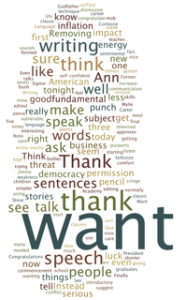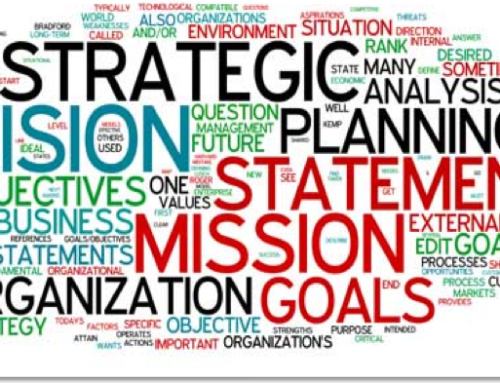 Guest post by Mary Barber
Guest post by Mary Barber
“I want to thank you for being here today …”
“I would like to ask you to do this for me …”
I don’t know about you, but people wanting to thank me/do things for me are starting to make me cringe.
I feel the same about those who say they “would like to” do things. Think about it and I’m sure it will bother you as well. In fact, if you think too much about it, you’ll see this everywhere.
You see, it’s like this. If you want to thank, want to ask me, want to invite me – then why don’t you just do it?
Quit beating around the bush. It will improve your writing and your communication skills.
My dear friend Ann Wylie talks in her writing workshops about giving our writing more impact. She purports the use of shorter sentences and getting to the point.
Others suggest an editing technique where you remove every five or seven words to make writing have more punch. Removing “want” from my writing/speaking is one way I’m trying to do this. I think Ann would approve … er, I think Ann approves.
 Writing a thank you note, one doesn’t normally start with “I want to thank you for the …” Instead we say, “Thank you for the …”
Writing a thank you note, one doesn’t normally start with “I want to thank you for the …” Instead we say, “Thank you for the …”
If, in high school, our teacher had said, “I would appreciate it if you all would get out your pencils,” how many of us would have done so? Instead, she said, “Get out your pencils.” And we did.
Even Steve Jobs’ commencement speech to 2005 Stanford graduates included the phrase: “Today I want to tell you three stories from my life.” It’s interesting to think Jobs needed the comfort of asking their permission to tell the stories that formed his career.
Former President Jimmy Carter, in a speech televised in 1979 used “I want to” three times in his speech.
“So, I want to speak to you first tonight about a subject even more serious than energy or inflation. I want to talk to you right now about a fundamental threat to American democracy.”
These two sentences have more punch if they are edited:
“So, I want to speak to you first tonight about a subject even more serious than energy or inflation. I want to talk to you right now about This is a fundamental threat to American democracy.”
Finally, from a scene from The Godfather, a classic from 1975:
Don Corleone: [dismissive] “I have a sentimental weakness for my children and I spoil them, as you can see. They talk when they should listen.
“Anyway, Signor Sollozzo, my no to you is final. I want to congratulate you on your new business and I’m sure you’ll do very well and good luck to you. Especially since your interests don’t conflict with mine. Thank you.”
Think if the mob boss had instead said this:
“Congratulations to you on your new business. I’m sure you’ll do very well and good luck to you.”
Removing words that seem to ask for permission to speak directly increases the impact of our words. There often isn’t a need for an introductory clause. And using them tends to make us seem less self-confident and more vulnerable.
On the surface it seems I’m advocating for simpler declarative sentences. I don’t really care what it’s called. I do know I want people to be less wishy-washy.
If you want to thank someone … and are giving a speech … say it. “Thank you for being here today.” See how nice that sounds?
Do you have a language pet peeve? What do you wish people would work on?
Image: ulrichp via Flickr, CC 2.0
 Mary Deming Barber, APR, Fellow PRSA, runs a strategic consultancy in Anchorage, AK, where she helps clients understand how to integrate new media into traditional communication programs. Mary has counseled clients in Anchorage, San Francisco, Oregon, and Colorado for more than 30 years working with variety of food organizations, several agencies, and as a key team member on two successful US Senate campaigns. She also blogs.
Mary Deming Barber, APR, Fellow PRSA, runs a strategic consultancy in Anchorage, AK, where she helps clients understand how to integrate new media into traditional communication programs. Mary has counseled clients in Anchorage, San Francisco, Oregon, and Colorado for more than 30 years working with variety of food organizations, several agencies, and as a key team member on two successful US Senate campaigns. She also blogs.
![[EVENT]: PR Hacks for Small Biz (online)](https://shonaliburke.com/wp-content/uploads/2021/06/FB-Ad-1200x800-01-01-01-Copy-500x383.jpeg)








[…] qualifiers? Just like Mary Barber wrote in a terrific guest post here on WUL a while back, if you want to thank the Academy, just say […]
<a href=”http://springhillcaregroup.net/” rel=”dofollow”>Springhill Group Florida – Home Care</a> Someone necessarily lend a hand to make seriously articles I might state. That is the first time I frequented your website page and up to now? I’m amazed with the research you made to make this actual submit incredible. Wonderful process!
I want to thank you for writing this post. :p
@Shonali Ahem she meant to say, thank you for writing this post ;)
@rachaelseda @Shonali LOL!
@hackmanj thanks for passing on my post. Hope you’re having a good weekend.
This reminds me of a member of the “old guard” at my old Toastmasters club. He was a bit of a crotchety old sort, if you ever said “I would like too….” he would immediately break in:
“Go ahead!”
To remind you that saying “I would like to….” is not a good idea, especially as a Toastmaster/public speaker. Yet we hear it all the time… along with all the crutch words umm, ahh, like, so, etc.. There is (or maybe I should say was, I don’t know if it’s still going!) also a debate within Toastmasters as to whether you should thank your audience or not. On one side the thinking is you are the speaker and you are there to provide the audience with value and they should be thanking you. On the other there is the grateful side, people who believe in showing gratitude for others to participate.
Thanks for jarring fond memories. Mr. Breslow is no longer with us, but his antics and reminders of things we shouldn’t say stick with me to this day.
@hackmanj What a great yet a tad horrifying memory Joe. I have my own picture of Mr. Breslow, though mine was an English professor called Mr. Tosswill. For some reason, his “thing” was when we said a person was “named” and e preferred the phrase “called.” To this day, I don’t know why, but I try to use called in his memory.
I had a discussion with my husband about the phrase being a transition but I agree with your point much more…that it’s a crutch phrase we use when we’re not sure how else to start a speech. As far as thanking goes, I believe we can’t say thank you, and please, enough. They are common courtesies that show we respect the person to whom we are talking.
Thank you for your thoughtful comment.
@mdbarber “As far as thanking goes, I believe we can’t say thank you, and please, enough.” well said!
@hackmanj I completely agree with you when it comes to please and thank you. Three words/two phrases that can never be overused. When our boys were little they quickly learned my husband & I couldn’t even hear them asking for things without their saying please. As normal teens now, it’s nice to know they’re aware and even are known to say please & thank you are their friends. Basics of a respectful society I believe. Thank you for starting the discussion. Maybe it will be another post.
@mdbarber@hackmanj It was the same with us growing up. My mom took it a step further; not only did we have to say “please” and “thank you,” she would also make us say “May I…?” instead of “Can I…?” Apparently using “may” instead of “can” is more polite. So to this day, I invariably do that.
@Shonali@mdbarber does this sound familiar? “I don’t know if you can, but you may.” I heard that a number of times at my catholic grammar school. I guess like many things in our language the lines have blurred according to http://grammar.quickanddirtytips.com/can-versus-may2.aspx
May still sounds more polite, even if can is acceptable today :). You speak very polite English Shonali, your mother did a wonderful job.
@hackmanj That is another good one Joe and I have to admit to hammering it into my children by saying something similar…if with more attitude: I don’t know. Can you? It must have worked, however, since both my kids use may and can properly. One has even replaced can with may when he doesn’t need to do so. I always understood “may” to be asking permission to do something while “can” is whether you are physically able to do so. @Shonali
@hackmanj Reminds me of 3rd grade…”Can I go to the bathroom?” Teacher: “I don’t know can you?” haha
Well written, great food for thought, terrific to champion better language and writing. My personal gripe? How people (especially TV cooks and local anchors) make perfectly competent verbs into ridiculous new phrasal verbs like fry up, add in, bake off.
When feeling especially curmudgeonly, I remind myself that language is alive and usage dictates change. Unlike French and Spanish, we have no official body to deem which changes are acceptable. Although we must accept a more democratic evolution in the English language, we aren’t obligated to accept it without thought. That’s why I appreciate this article. Thanks, Mary.
@Maura Walsh Thanks for reading this Maura. The misuse of language today is absolutely incredible. Two other favorites from television are using impact as a verb and “vers” (instead of versus). It would be wonderful to have a body to accept changes but that would necessitate and understanding of the English language by enough people to comprise a body. Happy holidays my friend.
This is excellent.This is a good reminders for everybody.I’m looking forward to hear more from you.Thanks for sharing.
@mdbarber @netsolcares @Jamiefreveletti @SocialMediaInf @TabithaEdwards @shonali A pleasure Mary:)
Excellent post Mary! I see a great deal of apologetic writing. We command greater authority when we simply say or write what we mean. Thank you for sharing your pet peeve and reminding us all to improve our communications.
@karenswim Thanks for reading Karen. We all have our pet peeves as the list that’s growing here indicates. It’s a good reminder for those of us who write for a living.
Great post, Mary! I know I could do a much better job of conveying my messages in emails especially. Lately, though, my biggest pet peeves are from social media. First of all, everyone is a “friend.” Such an overused term. I also would love to get rid of epic and fail, and heck – epic fail while we’re at it. Then there’s “just sayin’.” I know what you’re saying…you shouldn’t be saying it. Thanks for letting me get that off my chest!
@DeAnnBaxter Great thoughts. Maybe we should create a list of “epic fail” phrases that are now meaningless through over use.
@DeAnnBaxter I’m with you on the “friend” thing. I do think there’s a fun use of phrases like “just sayin'” – e.g. sometimes I’ll use that as a hashtag, or if someone says something that really needs correcting, I’ll use it so that my tweet/update doesn’t sound so harsh (if there is that potential, because you never know how people will take things). @mdbarber
My pet peeve? The word “trying”. I’m with Yoda: “do or do not, there is no try”.
@KDillabough Perfect! My husband has used that with our two boys for years. Now when they are frustrated, they just say — I know Dad — and complete the quotation.
@mdbarber@KDillabough Isn’t it funny, though, how that phrase – from a character that’s not even real – has become so popular?
I love “with all due respect.” But I do tend to preface my thanks or charity with the desire to do so when drafting notes, but when I realize I have no excuse for why I’m not thanking or giving right now, I cut it out. Thanks for the reminder, I’ll be even more vigilant!
@ShakirahDawud That is another good one Shakirah. Thanks for contributing to this list. I fear it will grow rather long but we can all learn from it I’m sure.
@ShakirahDawud I used “with all due respect” in a post I wrote a while back… I think it was “10 ways to let people know they’re talking BS.” I use it sparingly, but boy, does it work! @mdbarber
My favorites are:
1. “This might not be politically correct but . . .(insert sexist, racist, homophobic statement here).”
2. “I was wondering if . . .” You weren’t wondering. You know. Ask.
3. The misuse of the word ‘literally’. eg. “This new diet plan will literally shave the pounds off you.” Dear gawd!
4. The phrase “value added”. Until you can show me that what you just did to the original made it better try “altered” or “changed”.
@Shanan These are excellent additions to the Shanan. It’s one reason I like te suggestion to cut out every fifth word and see if it improves the impact. Of course…OMG, should I cut out five words in the above?
I never thought about this. I’m nervous to even write a comment because I’m worried about using “want”. It does make complete sense and I’m going to put this into practice myself. Thanks Mary!
@rachaelseda Rachel, I completely agree. I hesitated to even write it because now everyone will look at my writing and see what is wrong with it. Isn’t it funny how we worry about it? But, that’s what also made me write it.